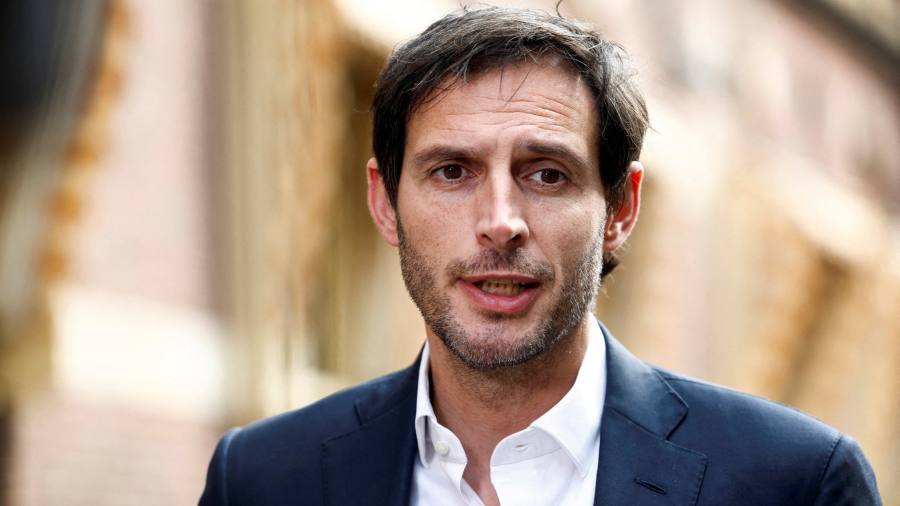
Receive free Climate legislation updates
We’ll send you a myFT Daily Digest email rounding up the latest Climate legislation news every morning.
The EU’s new climate chief has been given a mandate to explore carbon capture in an effort to limit global warming, as the bloc countries debate whether to make allowances for the controversial technology in upcoming UN negotiations to end the use of fossil fuels.
In a letter to Wopke Hoekstra, the Dutch nominee to be EU climate commissioner, European Commission president Ursula von der Leyen said he should “intensify efforts” to present “an ambitious, forward looking strategy” for the technology when he takes up his role.
Hoekstra, the former Dutch foreign minister, is due to take over in October from the EU’s previous climate tsar, Frans Timmermans, who left the commission to run in the Dutch elections. The 47-year-old who was previously a partner at the McKinsey consulting group, also once worked for the oil company Shell.
In his new role, he will oversee discussions for the EU’s 2040 emissions reduction target. The European scientific advisory board on climate change has recommended EU emission reductions of 90-95 per cent by 2040, relative to 1990.
EU countries were already “deeply divided”, one diplomat said, over whether to update the bloc commitment to cut emissions from 55 per cent to 57 per cent by 2030.
The Intergovernmental Panel on Climate Change has said that to keep global warming within the 1.5C level at which irreversible changes are expected to the planet, emissions must be cut by 45 per cent by 2030.
Carbon capture, use and storage technology is unproven at scale. However, as global carbon emissions continue to rise to dangerous levels, countries and industries are looking towards it as a means of curbing climate change.
The EU first laid out a framework for the use of carbon emissions removal technology in November last year and has said it will publish a road map for how it can be used in heavy industry, such as steel and cement making, before the end of this year.
But some policymakers and climate scientists fear that it could be a way for heavy polluters to avoid having to cut their greenhouse gas output.
Von der Leyen has also been pushing heavily for a global carbon price, ahead of the EU’s own carbon border tax coming into force in October, which will affect the import of goods from the heavy polluting sectors including steel and cement.
A senior EU official said that carbon capture should only be an option for those heavy industries that were difficult to decarbonise. “Don’t use it where you have other cheap mitigation alternatives,” they said.
The issue has been raised as part of negotiations over the EU’s position for the UN COP28 summit in Dubai starting at the end of November. The bloc’s 27 member states are still debating whether to call for a phaseout of “unabated” fossil fuels, or those burnt without capturing the emissions, according to diplomats and a draft document on the EU’s negotiation position.
Countries including Poland and Italy were among those pushing to include the word “unabated”, according to one EU diplomat, as it would limit the pressure to end the consumption of fossil fuels completely.
Maria Pastukhova, senior policy adviser at the E3G think-tank, warned that “countries negotiating international language on ‘unabated’ fossil fuel phaseout need to push for rigorous, high-ambition standards” to ensure that commitments to reduce fossil fuel use were genuine.
Global leaders were gathered in Nairobi on Tuesday for the first-ever Africa Climate Summit to debate how to finance environmental initiatives in a resource-rich continent that has been at the forefront of damaging changing climate patterns.
The summit is part of a series of international talks in the lead-up to COP28, which climate campaigners hope will result in a global agreement to cut fossil fuel use.
Kenya’s president William Ruto told the Financial Times that Nairobi would support a fossil fuel phaseout by 2050 at COP28, even as some of its neighbours — notably Uganda and the Democratic Republic of Congo — were pushing for oil projects around environmentally sensitive areas.
“We have absolutely no problem with any country pushing the assets they have, just the same way we have chosen our country to go renewable, because renewable gives us an opportunity to access energy, but in a way that is responsible,” Ruto said.
Climate Capital

Where climate change meets business, markets and politics. Explore the FT’s coverage here.
Are you curious about the FT’s environmental sustainability commitments? Find out more about our science-based targets here